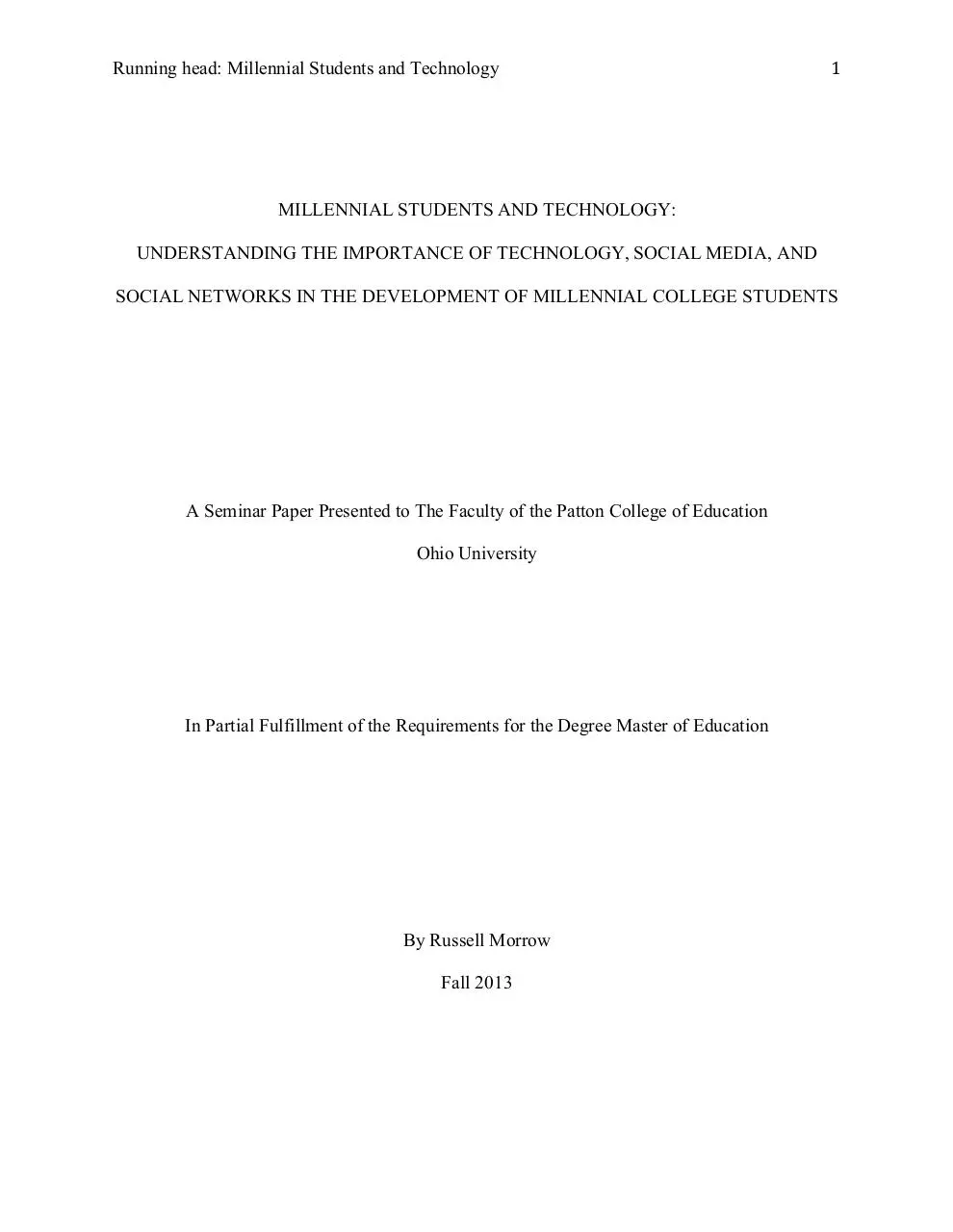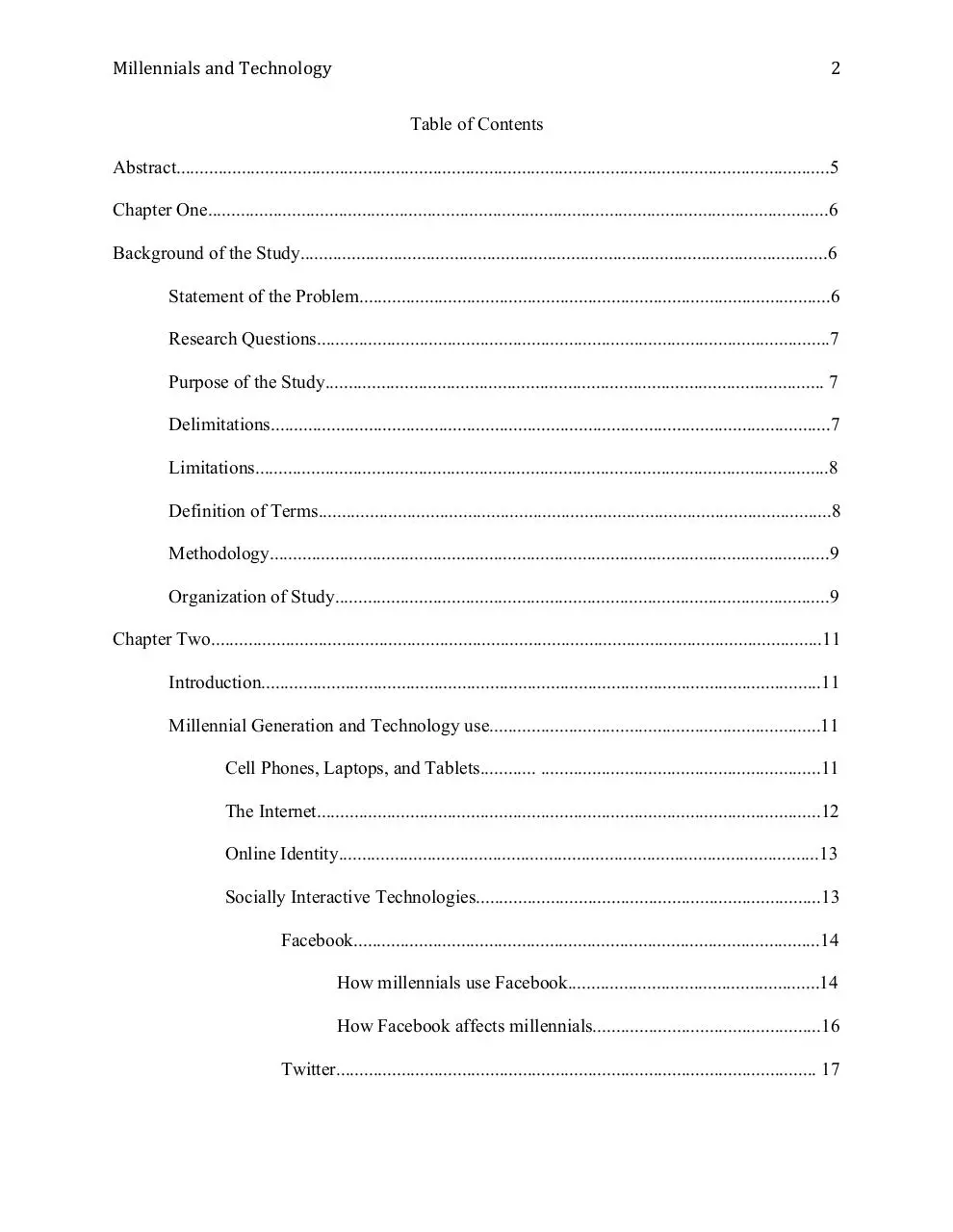Morrow Seminar Paper FINAL (PDF)
File information
Title: Microsoft Word - Morrow-Seminar Paper FINAL.docx
Author: Russell Morrow
This PDF 1.3 document has been generated by Word / Mac OS X 10.8.5 Quartz PDFContext, and has been sent on pdf-archive.com on 03/04/2014 at 04:50, from IP address 204.210.x.x.
The current document download page has been viewed 1200 times.
File size: 294.22 KB (53 pages).
Privacy: public file





File preview
Running head: Millennial Students and Technology
1
MILLENNIAL STUDENTS AND TECHNOLOGY:
UNDERSTANDING THE IMPORTANCE OF TECHNOLOGY, SOCIAL MEDIA, AND
SOCIAL NETWORKS IN THE DEVELOPMENT OF MILLENNIAL COLLEGE STUDENTS
A Seminar Paper Presented to The Faculty of the Patton College of Education
Ohio University
In Partial Fulfillment of the Requirements for the Degree Master of Education
By Russell Morrow
Fall 2013
Millennials and Technology
2
Table of Contents
Abstract............................................................................................................................................5
Chapter One.....................................................................................................................................6
Background of the Study.................................................................................................................6
Statement of the Problem.....................................................................................................6
Research Questions..............................................................................................................7
Purpose of the Study........................................................................................................... 7
Delimitations........................................................................................................................7
Limitations...........................................................................................................................8
Definition of Terms..............................................................................................................8
Methodology........................................................................................................................9
Organization of Study..........................................................................................................9
Chapter Two...................................................................................................................................11
Introduction........................................................................................................................11
Millennial Generation and Technology use.......................................................................11
Cell Phones, Laptops, and Tablets............ ............................................................11
The Internet............................................................................................................12
Online Identity.......................................................................................................13
Socially Interactive Technologies..........................................................................13
Facebook....................................................................................................14
How millennials use Facebook......................................................14
How Facebook affects millennials.................................................16
Twitter....................................................................................................... 17
Millennials and Technology
3
How millennials use Twitter..........................................................18
How Twitter affects millennials.....................................................19
Student Development Theories..........................................................................................20
Chickering’s Seven Vectors...................................................................................20
Schlossberg’s Transition Theory...........................................................................21
Astin’s Theory of Involvement..............................................................................22
Conclusion.........................................................................................................................22
Chapter Three ................................................................................................................................24
Introduction........................................................................................................................24
Millennial Generation and Technology Use......................................................................24
Cell phones, laptops, and tablets............................................................................24
The Internet............................................................................................................27
Facebook............................................................................................................................27
How millennials use Facebook..............................................................................27
How Facebook affects millennials.........................................................................31
Twitter ...............................................................................................................................36
How millennials use Twitter..................................................................................37
How Twitter affects millennials.............................................................................38
Conclusion.....................................................................................................................................41
Chapter Four..................................................................................................................................42
Review...............................................................................................................................42
Conclusions........................................................................................................................43
Recommendations for Practice..........................................................................................44
Millennials and Technology
4
Technological Devices...........................................................................................44
Facebook................................................................................................................46
Twitter....................................................................................................................46
Recommendations for Research........................................................................................47
Conclusion.........................................................................................................................48
References......................................................................................................................................49
Millennials and Technology
5
Abstract
This study is an exploration of literature discussing millennial college students and their use of
technology, social networks, and social media. With a focus on cellphones, the Internet,
Facebook, and Twitter, the study addresses the effects that these technologies and websites have
on millennials. Additionally, this study relates the findings of various research studies to the
student development theories of Arthur Chickering, Nancy Schlossberg, and Alexander Astin.
Drawing conclusions from the research, this study provides recommendations for incorporating
various technologies into student affairs practices. Using the research and conclusions from this
study, student affairs practitioners can enhance their understanding of technology use by
millennial students and use student development theory to develop efficient methods of assisting
this population of students.
Millennials and Technology
6
Chapter One
Background of the Study
The current leadership within institutions of higher education is faced with the task of
guiding, fostering, and developing a generation of college students unlike any generation before
them. The millennial generation, individuals born anytime between the 1982 and 2002 (Coomes
& DeBard, 2004; Junco & Mastrodicasa, 2007) are dominating the population of college
campuses across the country. According to Prensky (2001), on average millennials will spend
over 10,000 hours playing video games, over 20,000 hours watching television, and over 10,000
hours talking on cell phones by the time they graduate from college. However, only 5,000 hours
will be spent reading material not on a screen. Because of these statistics, it is often a struggle for
administrators who are not apart of the millennial generation to connect with these students.
Consequently, these administrators should utilize new methods of engaging and assisting
students.
Student affairs scholars are routinely taught that student development theory provides a
foundation to working with college students. Many of these student development theories were
conceptualized before current millennial college students were born and before the creation of
most technology that defines their generation. However, these theories are relevant because they
indirectly address why millennials are dependents of technology and how to use that dependency
as a way to assist them. When used as an outline rather than a step-by-step guide, student
development theories suggest that these emerging interactive technologies can be used as a
method of engaging and assisting students throughout their collegiate experience.
Statement of the Problem
Millennials and Technology
7
The problem of this study is to identify ways in which administrators can assist the
development of millennial college students through technology, social media, and social
networks.
Research Questions
1. What are current trends regarding millennial college students and the usage of
technology?
2. How do millennial students use Facebook, Twitter, and other socially interactive
website. How does using these sites affect them?
3. What is the relationship between student development theories, millennial college
students, and their use of technology and social media?
4. How does student development theory support the use of technology and social media by
administrators as a way to assist millennial college students?
Purpose of the Study
The purpose of this study is to understand the role of technology and social media use by
millennial college students and to identify how administrators can utilize student development
theory to guide technology based practices within higher education.
Delimitations
There is a lack of research that connects specific student development theories to
millennial students’ use of technology and social media. This study includes a limited number of
such studies. Most of the literature discusses technology trends and the effect of socially
interactive websites among the millennial generation (HERI, 2007; Yang & Brown, 2012; Pew
Research Center, 2012). Some sources (Prensky, 2001; Lowery, 2004; Palfrey & Gasser, 2008)
also discuss millennials and how they think and act. Additional research includes first hand
Millennials and Technology
8
sources from student development theorists and sources that analyze and discuss the implications
of student development theories.
Limitations
The main limitation of this study is number of available research connecting millennials’
social media and technology use to student development theory. Consequently, the application
of various student development theories to millennials social media and technology use is
considered acceptable by the researcher, which could be deemed a limitation. Another limitation
is the number of student development theories used in the study. The theories used in this study
are only a small percentage of the many student development theories that exist.
Additionally, there is lack of research that focuses on millennials and their use of specific
forms of social media and technology, rather than millennials and general social media and
technology usage. Lastly, due to the continuous changes in technological trends and the time
needed to create, implement, review, and publish a study, there is an increased possibility that
some studies are outdated.
Definition of Terms
Millennial Generation/Generation Y: all individuals born between 1982 and 2002 (Coomes &
DeBard, 2004). Throughout this study, “millennial” is used to describe any 18 to 25 year old
college student, even if the researcher does not specifically use this term.
Social Media: A form of communicating messages to large groups of people via the Internet
(Hartshorn, 2010).
Social Network: A member-based Internet community that allows users to post profile
information and to communicate with others in innovative ways (Pempek, Yermolayeva, &
Calvert, 2009).
Millennials and Technology
9
Socially Interactive Technology/Website: - Any social media or social network (Turner &
Croucher, 2013).
Digital Native: Any millennial who is a “native speaker” of the digital language of computers,
video games, and the Internet (Prensky, 2001).
Digital Immigrant: Any one not born into the digital world, but has adopted many or most
aspects of new technology (Prensky, 2001).
Methodology
A computer search through the ALICE system of the Alden Library at Ohio University
yielded the majority of the articles used in this study. Many of the articles were found searching
a combination of the words “millennial,” “technology”, “social media”, and “higher education
within the ERIC, Educational Research Complete, and Communication and Mass Media
Complete databases. Synonyms and more detailed terms such as “generation Y”, “social
networking”, “college,” “Facebook”, and “Twitter” were also searched. The year was limited to
anything after 2000. Other sources were also found within the reference list of selected articles.
Organization of the Study
This study is separated into four chapters. The first chapter provides an overview of the
problem that will be discussed. The chapter introduces four research questions related to
millennial students, the importance of social media and technology, and the role of
administrators with regards to millennials and social media. Additionally, the chapter provides
definitions of important terms that will be used throughout study. The chapter also discusses the
limitations, delimitations, and methodology of the study.
Chapter Two reintroduces the overall research problem and introduces the appropriate
literature. This chapter provides a review of literature that focuses on millennials’ technology,
Download Morrow-Seminar Paper FINAL
Morrow-Seminar Paper FINAL.pdf (PDF, 294.22 KB)
Download PDF
Share this file on social networks
Link to this page
Permanent link
Use the permanent link to the download page to share your document on Facebook, Twitter, LinkedIn, or directly with a contact by e-Mail, Messenger, Whatsapp, Line..
Short link
Use the short link to share your document on Twitter or by text message (SMS)
HTML Code
Copy the following HTML code to share your document on a Website or Blog
QR Code to this page

This file has been shared publicly by a user of PDF Archive.
Document ID: 0000155568.